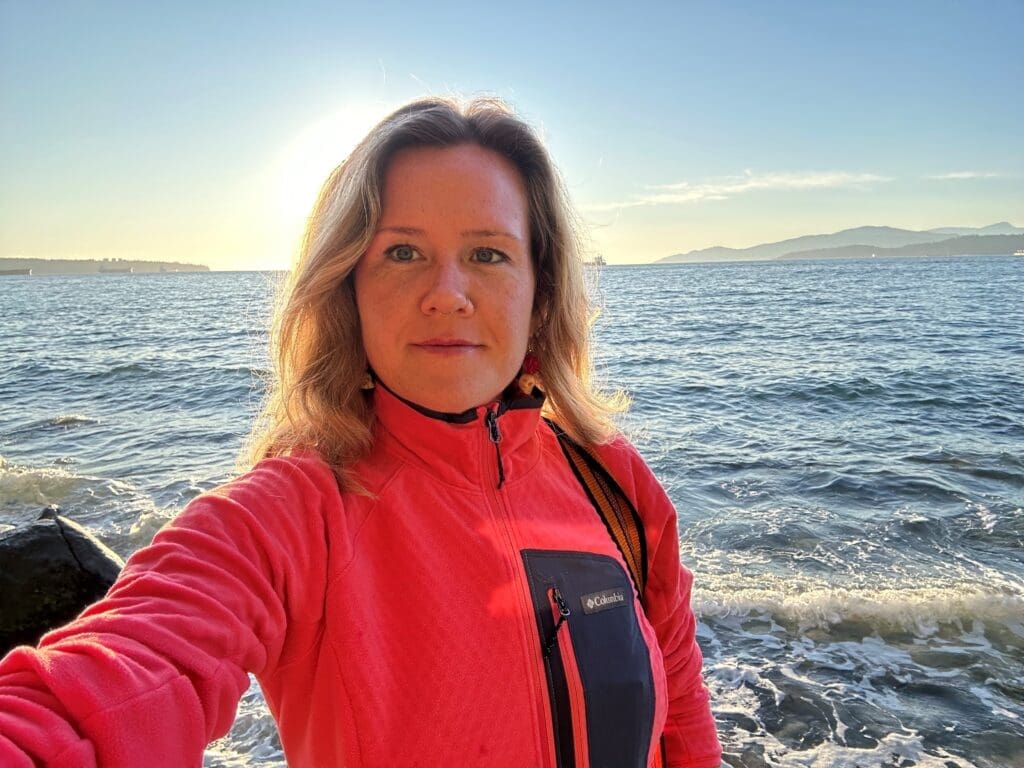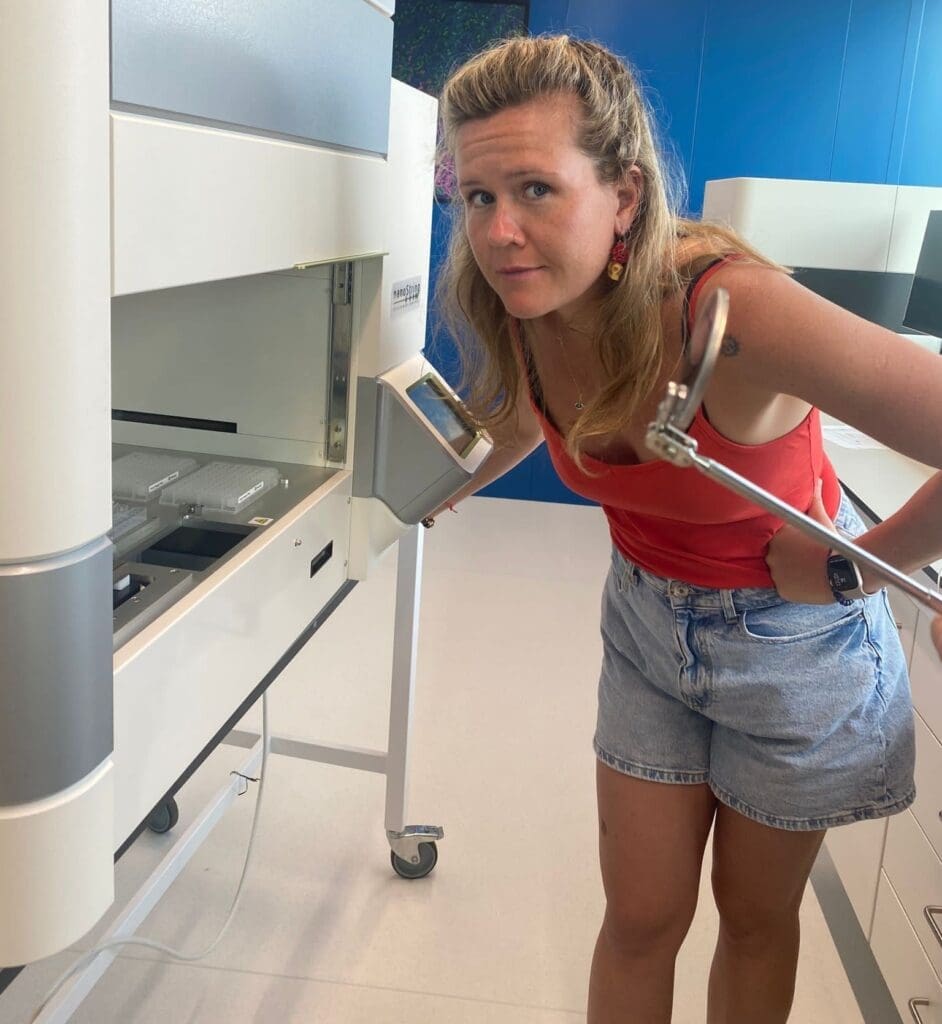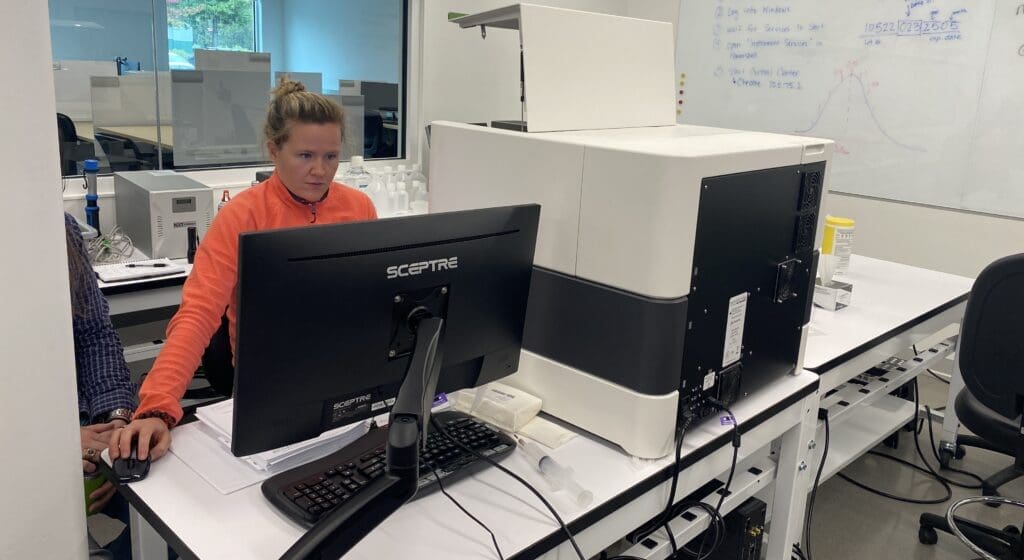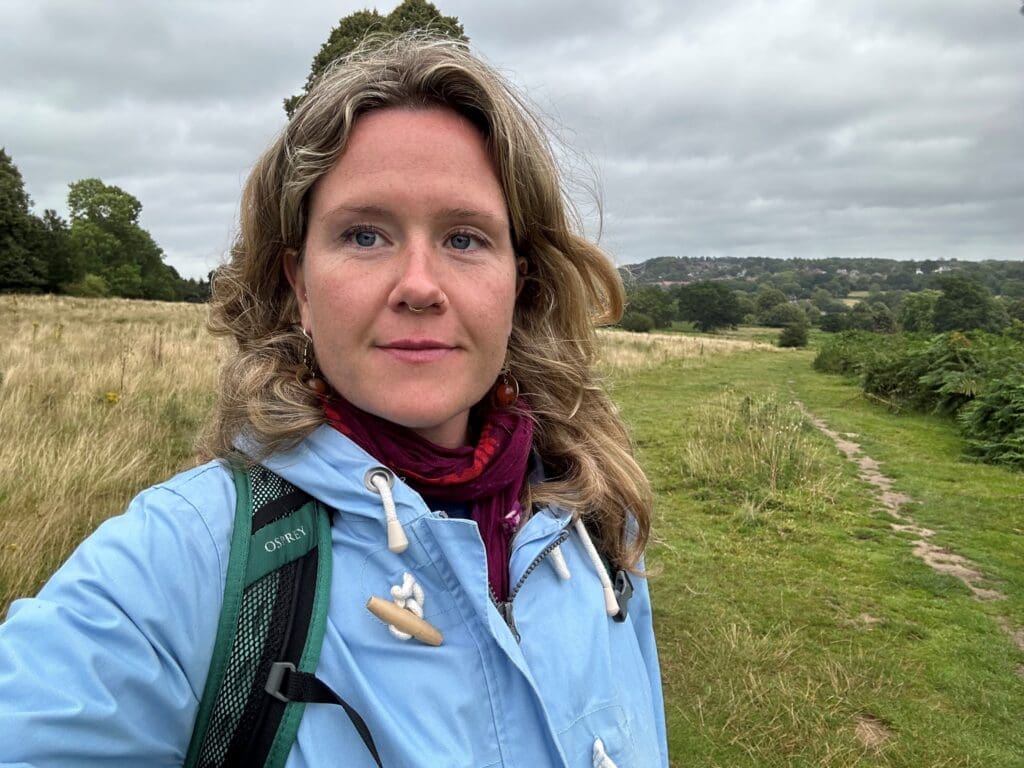Exciting life of an inspirational biotechnology field service engineer
This article focuses on the life of a biotechnology field service engineer working on different sites throughout the week.
Tamsin Jordan has a degree in Neuroscience and is currently working as an FSE (Field Service Engineer) for NanoString Technologies. Tamsin is currently based in the UK but has travelled extensively.


Spatial Biology/Biotechnology Field Service Engineer
Background
Have the way things work and how the natural world functions always interested you?
Yes, I have always been very inquisitive and always requested an explanation for the information I received.
What do you remember from your childhood which particularly fascinated you?
Anything to do with nature, animals, and human behaviour.
Why did you choose to study neuroscience rather than one of the other sciences?
I knew I wanted to study in Scotland and so choose neuroscience as it looked like an interesting subject.
Do you have a favourite scientist and why?
Globally, there are so many brilliant people working in research and developing innovative solutions who, don’t make it to mainstream biased media, so I don’t have a favourite scientist.
Personally, I enjoy hearing about environmental/ ecological innovation and research from around the world, especially about young women innovators.
Volunteering
Helping other people and volunteering has been a theme in your life. Why is this important to you?
For me, diversity is the richness of life and every day we can make a new discovery if we are open to them.
My experiences volunteering (and travelling) have presented new ways of thinking and understanding of the world we inhabit. I’ve definitely become more self-aware and curious about the effect of cultural conditioning. I realise there is no one right/wrong way to live.
Moving from studying to the workplace and to biotechnology field service engineer
How quickly did you adapt to working full time after university?
I adapted very quickly, I was very much ready to step out of university, travel, earn money, gain independence and more life experience and also skills.
How did you keep learning even though you had left university?
Every day is a learning day, by default of being alive. If it isn’t, that’s something to check in on in my book. I quickly realised (even at university) that university doesn’t give you all the answers. However, it more helps cultivate a way to think, analyse and to get answers.
In my experience, I viewed university as providing me with a title to get an interview, and a foot in the door. Then with determination and excitement to experience and learn different things, I took it from there.
Why do you think it is important for an engineer to be a ‘lifelong learner’ not just in their own field but in other fields?
Again, diversity is the spice of life and I always have the mentality that I didn’t want to stagnate in whatever I chose to do.
With the title of FSE (field service engineer), we have the ability to work across many sectors, in many different environments and with many different systems. Each system may be comprised of familiar components, but each system has its own nuances.
Being a lifelong learner adds a lot of value to my work life experience: it reduces monotony, keeps my mind engaged, my skill bank growing, which then enables me to experience different companies and systems and also enables me to become proficient in different things. In short, it is like a snowball of potential which keeps me rolling towards experiences I want to have. Win-Win.


Cultures and languages
You have lived and travelled in a number of countries including China, Spain, Australia, Canada, Colombia, UK. How has your experience with other languages helped you become a better communicator overall?
Living in different countries has shown me that to really thrive in a country, understanding the nuances of culture and mentality, are just as important (maybe at times even more important) as speaking the language.
“Blending in” culturally with how you dress, your body language, the understanding of the culture and how you interact with people goes a long way.
Knowing another language is like having a bridge between different worlds/ views/ ways of expression/histories and mindsets. Not only is it great for your physical brain and mentality, but it also gives the ability to see through different eyes/ interpretations of the world which I think is very powerful and unites people.
My experiences have opened my mindset so for example, I’m more open and curious about how different people communicate. So, I don’t see their communication/ language through the eyes of my cultural training but focus more on flowing with it to see where we arrive. It definitely leads to more tolerance, validating people and less friction.
Transferable skills
What skills did you improve or learn during your career break? How did it make you a better field engineer?
I refined interpersonal and intercultural skills, by understanding different cultures, and connecting with customers/users from all over the world. Science is a very international environment; I believe it helps build deeper relationships with customers/users when you have an experience of their culture/country and also the shared experience of living in a different country.
I’m fairly adaptable which is great if I have to go far and wide to different countries as a field service engineer (FSE). With these soft skills, I have gained more clarity on what I want from my life/ working life.
Travelling has bonded me with colleagues who feel less understood and unseen in a foreign workplace. This is because I could share in their cultural fun and expression like jokes, dancing, and music. It helps people feel more seen, understood, and accepted and not like an outsider who is only expected/accepted to behave/ express themselves in a certain way in the workplace.
Types of equipment and instruments used as a biotechnology field service engineer
What are the different types of equipment and instruments you have worked on so far?
The equipment I’ve worked on so far includes the following:
Laser based imaging/uncaging systems scanning systems-multiphon,
Optogenetic systems,
Fluorescent microscopes,
Flow cytometers,
Electrophysiology,
Spatial molecular imagers.
What has been the most interesting piece of biotechnology equipment you have worked on as a field service engineer?
Multiphoton system used in neuroscience research, and an imaging flow cytometer that was beautifully designed.
Have you ever worked with something which made you ask yourself, ‘who designed this?’
Yes, in both senses! Good and bad.
Typical week working as a biotechnology field service engineer
What’s your typical week like?
It varies but from Monday to Friday I travel. I prioritise breakdowns and installations. I plan as I go and am flexible to changes in plans (which frequently happens). Usually I’m booking accommodation, emailing customers, doing paperwork, and looking at travel logistics when I’m on a train. “On the go multitasking.”
How much of your time do you spend ‘hands on’ with customers and how much on administration, training, and other aspects of your role?
My role is 90% hands-on I would say. We have a good support structure so that enables me to be focused on the job at hand and not have to answer customer support issues in general. I’m sent as the hands-on person and thankfully the admin side of my job is straightforward and not time consuming.
How much travel do you do?
A lot from Monday to Friday every week, so I am usually packing on Sunday night.
How much of your work is involved with preventative maintenance? Why do you think this is vital? How do you persuade customers to prioritise preventative maintenance?
Since joining my current role, I have mainly been doing installations and breakdowns. In my previous role PMs were maybe 70% of my workload.
PMs are important, as we can find and fix issues (potential issues) during the PM and recalibrate the machine so that the user gets the best out of the system.
I’ve been to some systems which were so misaligned that I’ve thought: “how is the customer getting accurate data from this machine?”


Training customers and end users
How key is this to the job you do? Does a well-trained end user make your job easier?
In my current role, I don’t do any customer training but have done in the past.
It is vital that the customer knows how to use their system as it makes them more confident users streamlining their workflow and reduces any unnecessary downtime. If they run into an error message or the instrument doesn’t work as expected, they can do some of their own troubleshooting which can get them back up and running rather than waiting to talk to support and having a call out, that potentially could have been resolved by a reboot for example.
How do you explain something technical to someone non-technical or to someone who is having difficulty understanding?
Everyone has different talents and capabilities so just being aware that not all users will benefit from an in-depth technical explanation as this can stress them out more. The main thing they need to know is, what happened, when their instrument is ready to use again and is the issue likely to repeat.
If a customer is particularly interested in a technical explanation, then by all means it will be given. This in my experience is a very small number of users.
Most challenging part of the job as a biotechnology field service engineer
What is the most challenging part of your job – technical side, logistics or customers?
It depends on what the issue is, where the system is located and if it can be resolved in a good time frame. In some circumstances it can be that all three are challenging, but in general logistics and fatigue would be the more challenging if I had to pick (assuming that I know the system well).
What has been your most challenging job to date?
Probably my previous job, a kind of “baptism by fire”. I joined at a time when in the EU all previous engineers (and thus expertise) left the company. Training was short and sweet, user manuals weren’t great, so we had to rely on the USA west coast waking up. So, they were long days, with not much easily accessible knowledge. Not an ideal situation or ideally managed situation, but everything is a learning curve.
What do you do when something is not working, and there is no obvious reason?
I think there always IS a reason so best troubleshoot. When we get to the root cause, sometimes it’s a cool learning curve. Otherwise start thinking positive thoughts and activate the law of attraction.
Women in science and engineering
The industry is changing but remains predominantly male. What do you think will change over the next ten years?
I think the way we work and how we tackle things will change, as we are still working from an old paradigm. Many FSEs (including myself) realistically sacrifice a lot in our lives. For example: hobbies, time with family/friends. We do this in order to be able to live the benefits of FSE life, which depending on the job can be a lot of fun.
However, I definitely notice there is an overall lack of balance and usually in companies the FSEs are undervalued and seen more like an expense.
A company has many cogs, if one cog is removed, then the company would eventually stop working. I look at it from that perspective.
Gender bias
I do believe the FSE role is definitely set up for males. For example,
expectation of work performance is very linear. We are expected to perform Monday to Friday, week to week continuously moving and executing the workload. A woman’s physical reality is cyclical (which has great power in itself).
It can be like asking the giraffe to climb the same tree as the monkey for a specific leaf, when in reality, the giraffe knows how to reach the leaf and can actually get it in a more streamlined way.
In a way the belief is that we all have to act like or be a monkey to achieve the same outcome. This could be said of many ideas and systems the world has in place. “Insert topic here”.
Health and safety
How systems are designed is also key. I’ve worked on many systems that are unnecessarily bulky and heavy and are not designed with health and safety in mind. Even the dimensions of systems favour taller and stronger bodies. I will say, that FSEs (all people) work every day with systems and in positions that are not conducive to good health and risk injury- that’s another topic.
Travel
Travelling from Monday to Friday on a regular basis is another factor in the percentage of women in the FSE workforce. Culturally it’s still more accepted that the man goes out to hunt and the woman stays to nurture the home/children/ animals/plants. I’ve had a few customers in the past ask me about:
what my partner thinks about me not being at home;
do I want kids and what will I do if I have kids;
how long I will do the role for.
I always wonder if the men get asked the same question especially regarding children. It’s like some people are allergic to female empowerment and equality.
Cultural views
Which partner is willing to stay at home with the family/ pets/plants/ living place during the week?
“Safety concerns”
I personally have experienced jobs taken away from me, due to someone else (a man) making a call over my safety and what was essentially the best for me. This happened without asking how I felt about the situation. For example, there was a job in Brazil that I was super excited to go to. However, it went to a male sales colleague instead as one man decided it was “too dangerous” for me. The (sad) irony is that I backpacked through Latin America for a year alone.
Financial Pregnancy concerns
As the FSE role is a continuously travelling role, I do believe employers are more resistant to hire women for fear of pregnancy and having to pay for maternity leave. Plus there is then the assumption that the woman will naturally leave the role. I had a recruiter once ask me (after I had accepted an offer) if I was single and if I was thinking about having children in the near future. He was asking to make sure he got his pay out.
Value
I believe that all people, not just women, are becoming more aware of the value that THEY bring to employers and companies and are re-evaluating what kind of work experience and perceived benefits they are willing to exchange their time for. Time is something no one gets back.
Encouraging diversity field service, biotechnology and engineering
How can more women receive encouragement into different types of science and engineering roles?
This is an interesting question. Let’s start from encouraging women into the role. There are four key areas to consider.
Education
We need more taught examples in formal education and in the media normalising and celebrating women in STEM subjects. This can range from the images we receive to the stories of achieved scientists that we learn about. If I reflect back, the only female scientist I heard about in school was Marie Curie. The rest were male so on a subconscious level, it seemed shut off to me as a female. Luckily, I had excellent female science teachers who encouraged me and were role models that our biased history didn’t show me.
How we engage with and understand science and engineering
Science and engineering are the flow of creativity and exploration of potential. How we teach these subjects needs revamping (way more hands-on experience and touching on a wide range of themes/topics). These are such vast, dynamic, and exciting subjects that we should be able to engage everyone, or at the very least stimulate curiosity. We are all users of science and engineering, so we should be making it as inclusive and engaging as possible from an early age. What we teach in schools should ideally reflect this.
Applications of science and engineering
Exposure to how we apply science and engineering in society is also key. We need exposure from an earlier age to the variety of jobs that exist out there and types of lifestyles people can experience via science and engineering. This is especially true for the quirky ones as they might inspire a lot more people.
In high school and university, when I told people that I wanted a job that allowed me to travel, they presented me with “air hostess”, or “travel agent”. There was no apparent understanding of how being a scientist enabled you to travel the world even though in some circumstances, it’s an expectation!
Barriers
I think it’s important to also talk about barriers to entering certain jobs. I am now the only woman on the FSE team.
Representation, education, guidance, role models in the industry and media exposure are all key to showing that women can and do work as FSEs.
Diversity in teams
What do you consider to be the value of diverse teams and how does this benefit field service engineering in particular?
I must admit that in all my FSE teams, I have been the only female (apart from in my current role where there was another female FSE) and usually the youngest. My teams have not been ethnically diverse either.
The value of a diverse team in terms of age, gender, and ethnicity is that every human brings their own spice and strength to a team. I personally think that it shows a great side to a company when they break out of outdated ways of thinking and operating and include a diverse range of people. As well, they offer opportunities to people who don’t necessarily have merits on paper yet, but who have energy, and an open mind, drive, passion, vision, flexibility, because then there is a great team/company in the making. And let’s be honest, at least in the science sector, you want a company that reflects the diversity of its users and FSEs who can understand and connect well with the end users.


Making a future star
Apart from a strong technical background, what are the three most important skills for a field service engineer to have?
The three are flexibility, independence, and the ability to be adventurous and so treat every day as a new adventure.
Further reading
A gender-neutral field service engineering workforce
Advice For Women Engineers Working In Gender Imbalanced Teams


Responses